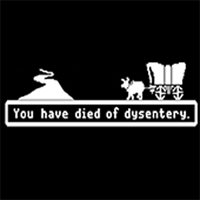
Recently, I was cheered to discover my nephew playing a hand-held version of the generation-defining game The Oregon Trail, a game I first played on the Commodore 64 (or maybe the Apple II? Have I sufficiently dated myself?). The objective of the game is straightforward enough: get yourself and your traveling companions from Independence, Missouri to the Willamette Valley before winter sets in (the specter of the Donner Party was never too far in the background). The game presents you with a series of fateful decisions. You initially outfit your party at the general store spending a fixed amount of money (bankers start with more, farmers with less) on oxen, clothing, food, ammunition and spare parts to repair your Conestoga wagon. Then, you choose when to depart: leave too early and there will be no grass for your oxen; leave too late and you run into winter. Along the way, you use up resources trying to generate other resources: there are opportiunities to hunt for food, which uses up ammunition; and, you can trade for supplies as you go. Game play is essentially solving a series of resource management puzzles. The health of your party depends on some things things over which you have some control, like pace and rations, and some things over which you have much less control, like the weather and broken axels.
I do not play computer games anymore, perhaps to my own detriment, but I certainly make daily use of the skills I developed while playing those early computer games, which were, at their core, turn-based strategic simulations. What I did not appreciate then, but certainly do now, is the extent to which these simulations were introducing me to some of the basic ideas of systems thinking.
The term “systems thinking” can mean different things to different people. It can refer to a collection of diagnosic tools and methods, such as causal loop diagrams, for examining problems more completely and accurately before acting, allowing us to ask better questions before jumping to conclusions. It is also a "mind set" sensitive to the intrelated nature of the world in which we live. Systems thinkers are dissatisfied observing discrete events and sets of data; they challenge themselves to discover patterns. And, they look to to surface the underlying structures that explain those patterns. Once surfaced, we can then change those structures in ways that will help bring about the outcomes we desire. In the absence of systems thinking, the processes responsible for yielding those outcomes too often remain mysterious and unamenable to change.
The Systems Thinker offers (for free, courtesy of the Omidyar Group) essential works of Daniel H. Kim, Colleen P. Lannon and Barry Richmond, among other systems thinking notables, since the 1980s. I cannot recommend a set of resources more highly. Much of my own practice involves testing how far the tools and methods of systems thinking can be applying in the world of philanthropy.